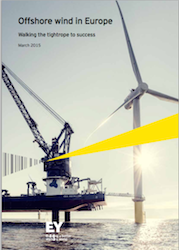A new study, “Offshore Wind in Europe: Walking the tightrope to success,” finds that the European offshore wind energy industry can compete with coal and natural gas by 2023. The Ernst & Young (EY) reports states that for this to occur, however, the industry must significantly reduce costs over the next five years.
 Cost savings can be achieved in several ways including deploying larger turbines to increase energy capture (9%); fostering competition between industrial players (7%); commissioning new projects (7%); and tackling challenges in the supply chain such as construction facilities and installation equipment (3%). These actions, coupled with strong, long-term regulation will enable offshore wind energy to compete.
Cost savings can be achieved in several ways including deploying larger turbines to increase energy capture (9%); fostering competition between industrial players (7%); commissioning new projects (7%); and tackling challenges in the supply chain such as construction facilities and installation equipment (3%). These actions, coupled with strong, long-term regulation will enable offshore wind energy to compete.
Parallel to release of the report, three of the biggest names in offshore wind have initiated a joint declaration – called ‘United Industry‘ – as part of a commitment to reducing costs in the sector. Dong Energy, MHI Vestas and Siemens Wind Power and Renewables have pledged to undertake joint and individual actions across the whole of the value chain to deliver “major long-term and tangible advancements.”
Michael Hannibal, CEO Offshore of Siemens Wind Power and Renewables, said, “Cost reduction remains a top priority of the offshore wind industry. We need to create profitable investments for offshore projects independent of subsidies. In a united industry, all stakeholders across the whole value chain are equally responsible to contribute and deliver. Siemens takes full ownership of this challenge. If we all do that, we will win.”
“For offshore wind to realise its full and significant potential, we need to continuously reduce the cost of electricity,” added Claus Hviid Christensen, vice president in DONG Energy Wind Power. “The good news is that we are indeed on the right track, and we are already seeing the industry taking important steps forward with an impressive pace. With a clear political framework for the development of offshore wind power after 2020, I am confident that we will meet our target of making offshore wind fully competitive with alternative energy technologies.”
The European Wind Energy Association (EWEA) believes offshore wind power will play a growing and important role in Europe’s energy security. “As much as we need politicians to come on board, it is also up to the industry to deliver on our commitments. It is no secret that cost reduction is a great challenge that we face in the offshore business; but as we continue to work together, innovate and compete, the sector will face down its trials in the years ahead,” stressed EWEA CEO Thomas Becker. “We must not forget the jobs, trade and growth that offshore wind is contributing to Europe.”

